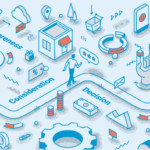Trust is at the core of every strong relationship, including the relationships between retailers and their customers. When retailers focus on building trust, they reap benefits in the form of increased customer loyalty, retention, and sales.
So, what is a trusted retail customer relationship? Trust is when customers believe that a retailer will do what it says it will. But trust doesn’t happen overnight. It’s something that has to be earned through every customer interaction. And, if something happens to break a customer’s trust, it’s very difficult for a retailer to rebuild it.
In other words, building customer trust is hard work – and well worth it. When customers trust a retailer:
- They are loyal. Eight in ten customers say they will continue to purchase from a brand they trust.
- They become advocates and influencers for the brand. Eighty-three percent of customers will recommend a brand they trust to others. These recommendations matter – 93 percent of consumers trust recommendations from family and friends above all other sources of information when making purchase decisions.
- And they spend more. Loyal, repeat customers spend 67 percent more than new customers. And the amount of spending goes up the longer they remain a customer.
5 ways to build customer trust
1. Deliver seamless service – online and in-person.
Customer service is a primary driver of trust. Nearly 90% of customers say they trust businesses with “very good” service. Today’s shoppers have high expectations. Fifty-five percent report that their customer service standards have risen over the past year.
To meet – and exceed – customer expectations, retailers must deliver integrated customer experiences across e-commerce and in-person shopping. When a retailer delivers a strong omnichannel experience, their average customer retention jumps to 89 percent vs. 33 percent for retailers whose omnichannel experience is lacking. To further integrate your store’s brick-and-mortar, e-commerce, and mobile channels, look to your point-of-sale (POS) system. In addition to helping you deliver consistent customer experiences, your POS system helps to keep your business running smoothly with customer relationship management, inventory management, and reporting capabilities.
Related: How to Optimize Omnichannel Retail and Keep Customers Coming Back
2. Protect customer data.
Data security is one of the most critical elements behind building customer trust. Nine in ten consumers cite data privacy as an important factor. Today’s customers expect retailers to be transparent about the data they collect and how it will be used. Of course, protecting payment information is a central focus for retailers. Choosing the right POS system is critical. Look for a POS option that provides point-to-point card information encryption for standard retail transactions plus subscription services, on-account billing, and batch processing. Make sure your POS system maintains security that aligns with the Payment Application Data Security Standards (PA-DSS) for how customer payment information is processed and stored.
Related: Retail Payment Preferences: What Today’s Customers Expect
3. Invest in hiring and training.
Your retail associates can be a crucial differentiating factor in building customer trust. Engaged employees with deep product knowledge and a commitment to customer service create memorable experiences and inspire trust. Develop a profile of ideal associate attributes and then hire thoughtfully. Perhaps more importantly, invest in ongoing training to ensure associates understand your brand, products, and POS tools. Then, trust your employees to provide proactive, customer-centric service that aims to create long-term customer relationships, not just sales.
Related: Does Your Store’s Customer Experience Stand Out?
4. Ask for – and act on – feedback.
With the rise of social media, customer feedback – both positive and negative – is immediate. It’s essential for retailers to listen to their customers and respond quickly. Build-in opportunities to ask customers for input through formal channels like online surveys as well as informal one-to-one customer interactions. Then, take action based on the feedback you receive. Eighty-three percent of customers report having more loyalty for brands that are responsive when resolving complaints. But speed counts, too. Just 17 percent of customers say they would recommend a brand that responds slowly, even if they resolve the issue.
5. Reward loyalty.
The biggest outcome that comes from earning customer trust is loyalty. For retailers, long-term loyalty is extremely valuable. Boosting customer loyalty by just 5 percent can increase profits anywhere from 25 to 95 percent. Cultivate and recognize loyalty among your customers to maintain and increase their trust levels – and generate authentic word-of-mouth referrals. Strategies to drive loyalty should include simple things like thank-you notes and personalized service based on accessible customer profiles within your POS system. Plus, implement a formal customer loyalty program that blends discounts with perks like early access to promotions or new product previews. Eighty-three percent of shoppers are more likely to make repeat purchases as a result of a store’s loyalty program.
Trust is built through consistent, authentic interactions with your customers. POSIM, an integrated point-of-sale and inventory management system, is designed to help you build and strengthen customer relationships. To learn more, discover which POSIM plan is right for your business and ask us for a demo today.












